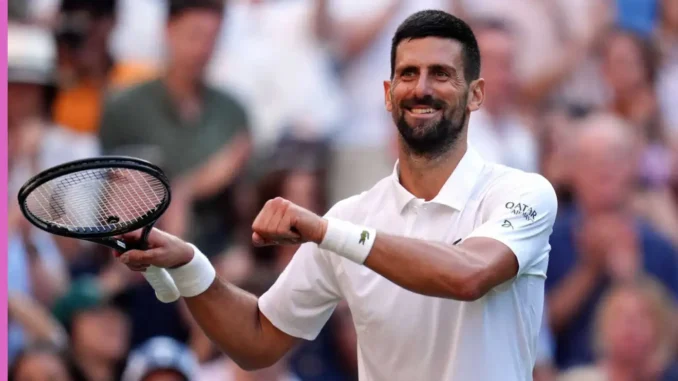
In the high-stakes world of professional tennis, Novak Djokovic stands as a towering figure, his 24 Grand Slam titles and record 428 weeks as world No. 1 cementing his legacy as one of the sport’s greatest. Yet, the 38-year-old Serbian’s polarizing persona—often seen as prickly or defiant—has sparked endless debate among fans and critics. Now, Pepe Imaz, Djokovic’s former ‘mental guru’ and a trusted confidant, has offered a heartfelt defense of the tennis icon, claiming that those who truly know him would see a “wonderful human being” whose empathy, generosity, and thirst for growth shine far beyond his on-court triumphs. As Djokovic faces a challenging 2025 season, sidelined by injury and absent from key US Open tune-ups, Imaz’s words paint a vivid portrait of a man whose heart matches his competitive fire.
Imaz, a 51-year-old former Spanish tennis pro turned sports psychologist, first joined Djokovic’s team in 2016, introduced by the Serb’s younger brother, Marko. Their bond began with an awkward encounter but blossomed into a deep friendship rooted in shared values of emotional well-being and personal growth. Recalling a pivotal moment in 2016, Imaz described finding Djokovic in a moment of vulnerability after a crushing defeat. “I knocked on the door and everyone was surprised,” Imaz recounted. “Novak was sitting in an armchair, his elbows on his knees, looking down. When he heard me, he raised his head and looked at me. He didn’t answer, but his expression was approving. I approached him… and asked if I could give him a hug. I then gave it to him. I saw a human being in pain, having not achieved something he so desperately wanted, and I felt the best thing I could share was my respect, love, and affection for him.” This moment, Imaz said, solidified a connection that extended to Djokovic’s wife, Jelena, and their family, transcending the typical coach-player dynamic.
Imaz’s approach, which prioritizes emotional resilience over rigid analytics, initially drew skepticism. In 2017, Djokovic’s first Grand Slam-less season since 2010 coincided with Imaz’s tenure, leading critics, including former coach Marian Vajda, to question his influence. “Yes, I was pushing his end, though it was not my No. 1 condition,” Vajda admitted in 2018, insisting he needed to see Djokovic personally to resume coaching. Boris Becker’s departure from the team in 2017 was also reportedly tied to Imaz’s presence. Yet, Marko Djokovic defended the Spaniard, revealing that Imaz had been working with Novak for years before the 2016 slump, which was exacerbated by a debilitating elbow injury. “In 2016, Novak injured his elbow,” Marko explained. “I remember him screaming in pain at every serve during training. Despite this, he emptied himself in Roland Garros and managed to win. Then he deflated.” Imaz, Marko insisted, was a positive force, helping Novak rebuild mentally during a turbulent period.
Djokovic’s off-court persona has often been scrutinized, from his vaccine skepticism during the 2020 Adria Tour controversy to his association with polarizing figures like Bosnian Serb leader Milorad Dodik. His refusal to be vaccinated led to his 2022 Australian Open deportation, a saga that Serbian leaders decried as “scandalous,” while critics labeled him a COVID skeptic. Yet, Imaz sees a different side. “Novak is a wonderful human being. He has shortcomings, like you and me; but he strives to grow as a person and does what he can in that regard,” he said. “I’m not going to say a word about the extremely difficult times he’s been through, but there have been many more than people think.” Imaz praised Djokovic’s curiosity, noting his love for reading and learning from others without prejudice, a trait evident in his philanthropy. Through the Novak Djokovic Foundation, established in 2007, he has built 51 schools in Serbia and supported over 20,800 children, earning him the 2012 Arthur Ashe Humanitarian of the Year award.
As Djokovic navigates 2025, his absence from the Canadian and Cincinnati Opens—key US Open warm-ups—raises concerns about his fitness after a Wimbledon semifinal loss to Jannik Sinner, where a fall against Flavio Cobolli may have aggravated an injury. Currently ranked No. 6 with 4,130 points, he risks slipping behind Ben Shelton or Alex de Minaur. Yet, Imaz’s reflections remind us of Djokovic’s resilience, forged in war-torn Serbia, where he trained in an empty swimming pool and sought shelter during NATO bombings. “He is a street fighter. That is his mentality,” said former coach Boris Becker, a quality that has seen him overcome hostile crowds and fierce rivals like Federer and Nadal.
Imaz, who still trains with Djokovic in Spain and provides Eurosport commentary, remains a steadfast ally. “I feel a great affection for him,” he said, celebrating their “profound experiences.” As Djokovic eyes a potential 25th Grand Slam at the US Open, Imaz’s words challenge the narrative of a cold competitor, revealing a man whose warmth and humanity shine brightest away from the spotlight.
Leave a Reply